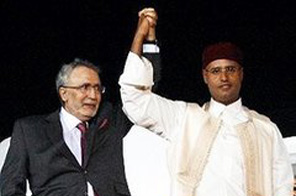Britain, US slam Libya over welcome
LONDON: Britain and the United States reacted with fury at a hero's welcome given to the freed Lockerbie bomber on his return to Libya, warning Tripoli of serious diplomatic repercussions.
Libyan leader Moamer Kadhafi met Friday with Lockerbie bomber Abdelbaset Ali Mohmet al-Megrahi and praised the Scottish authorities for their "courage" in releasing him from prison, the official news agency Jana reported.
"At this moment I would like to send a message to our friends in Scotland, the Scottish Nationalist Party, the Scottish prime minister ... and I congratulate them on their courage and for having proved their independence despite the unacceptable and unreasonable pressures they faced," Kadhafi was quoted as saying.
Kadhafi met with Megrahi his family and a large number of his relatives, the news agency reported.
US President Barack Obama said the rapturous welcome for Megrahi was "highly objectionable".
And in a first sign of possible fallout, Britain was reported to be reconsidering an upcoming royal visit to Libya.
Megrahi, the only person found guilty of blowing up Pan Am Flight 103 over the Scottish town of Lockerbie in 1988, was greeted by hundreds of people waving Libyan and Scottish flags when he arrived in Tripoli late Thursday.
He returned from Scotland, where he was serving a life sentence for killing 270 people on board the 747 and on the ground, in a Libyan jet with a delegation including Libyan leader Moamer Kadhafi's son Seif al-Islam.
The scenes of jubilation came despite a call from Washington to avoid such celebrations, while Obama said earlier the Scottish government had blundered in deciding to release the 57-year-old.
"The images that we saw in Libya yesterday were outrageous and disgusting," White House spokesman Robert Gibbs said.
"We communicated with the Libyan government, we continue to watch what they do in the days going forward about this individual, and understand that the video that you saw yesterday was tremendously offensive to the survivors that lost a loved one in 1988."
British Foreign Secretary David Miliband also slammed the welcome. "Obviously the sight of a mass murderer getting a hero's welcome in Tripoli is deeply upsetting, deeply distressing," he told the BBC.
"It's very important that Libya knows... that how the Libyan government handles itself in the next few days... will be very significant in the way the world views Libya's re-entry into the civilised community of nations," he said.
Miliband angrily refuted suggestions that the British government wanted Megrahi freed so that commercial relations with oil-rich Libya could be improved.
"I really reject that entirely," he said. "That is a slur both on myself and the government."
Speculation there had been some form of agreement was fuelled by the disclosure that Britain's Business Secretary Lord Peter Mandelson met Seif al-Islam during his recent holiday on the Greek island of Corfu.
A spokesman for Prime Minister Gordon Brown's Downing Street office firmly denied that Megrahi's release was linked to Britain's interest in Libya's oil and gas reserves.
"There is no deal," a spokesman told AFP.
"The position remains the same as we have been making clear: this has always been a matter for the Scottish executive and ministers," he added.
Brown had written to Kadhafi to urge his country to "act with sensitivity", according to Brown's office.
And in a sign of potential strains, a planned visit to Libya by the Duke of York, Queen Elizabeth II's second oldest son, was being reviewed, according to the BBC.
A spokesman for Prince Andrew said only that the early September trip had been "in its planning stages", while the Foreign Office said: "We have not received an invitation to attend.
"We will take a decision only if and when an invitation is posted to us," said a Foreign Office spokeswoman.
Scotland's First Minister Alex Salmond meanwhile defended the decision taken by Kenny MacAskill, his justice minister, to release Megrahi, who has terminal prostate cancer, on compassionate grounds.
"This case... was always going to divide opinion, that's inevitable," he said, adding: "All that we can do is to take a decision in the interests of justice, with no ulterior motives whatsoever."
Salmond also added to the chorus of criticism over Megrahi's reception.
"I don't think that was wise and I don't think that was the right thing to do," he said.
However Libya's former ambassador to London, Ahmed Zwei, said Megrahi deserved his country's gratitude.
"We consider Megrahi to be a fighter who made sacrifices for his country and we should respect him," he told AFP.
Announcing his decision Thursday, MacAskill said "our beliefs dictate that justice be served, but mercy be shown".
Doctors say Megrahi may have less than three months to live but victims' relatives lined up to condemn the decision.
"You commit mass murder, an act of terror, kill all of those innocent young people... and you are released for compassion?" said Susan Cohen, whose only daughter Theodora was killed in the attack on December 21, 1988.
A total of 189 Americans were killed in the bombing, the worst attack carried out by extremists in Britain.
The release prompted heavy press criticism on both sides of the Atlantic.
"Here is deep injustice. Here is callous disregard for the theft of so many lives, as well as for the pain of loved ones and friends," said The New York Daily News.
In Britain, The Times said: "The decision to release the man convicted of the Lockerbie bombing was taken with all due consideration and compassion. But it is the wrong decision all the same."






